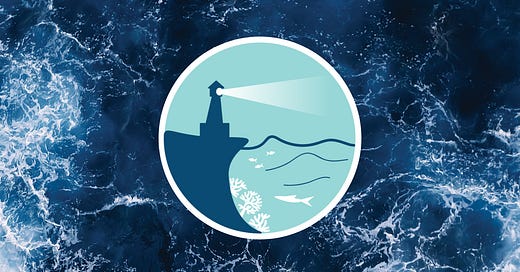Who’s in session this week?
The House and Senate both back in session after two weeks of recess, the longest break of the year so far.
Make sure you have the ESP Advisors printable 2025 Congressional Schedule and our public 2025 Congressional Google calendar at your fingertips.
News Highlights
The Trump Administration issued a new executive order, "Unleashing America’s Offshore Critical Minerals and Resources," aimed at fast-tracking U.S. access to deep-sea minerals. The order directs federal agencies to streamline permitting for seabed mining in U.S. waters and aggressively pursue international partnerships and claims beyond the U.S. Exclusive Economic Zone.
Reps. Salud Carbajal (D-CA-24) and Brian Fitzpatrick (R-PA-01) reintroduced the Ocean Acidification Research Partnership Act (H.R.2991). The bill would authorize research grants to study the effects of ocean acidification and its impacts on U.S. fishing and tourism industries.
The Center for Biological Diversity filed a lawsuit against the Trump Administration for failing to release public records on the impacts of mass firings at NOAA, which the group argues have severely undermined protections for endangered marine species like whales, sea turtles, and corals by eliminating key scientific and conservation roles.
Written by Emily
Happenings This Week
The Republic of Korea is hosting the tenth annual Our Ocean Conference this week, from April 28-20, with an overarching theme of examining how digital technology can help address challenges facing the ocean. Improving seafood traceability is a major focus of the U.S. delegation at the conference.
It is also DC Climate Week with people in town from around the country and events happening throughout the city related to business, innovation, and climate.
Seabed Mining Push Sparks New Questions
Last week, the Trump Administration issued a new executive order, "Unleashing America’s Offshore Critical Minerals and Resources," aimed at fast-tracking U.S. access to deep-sea minerals. The order directs federal agencies to streamline permitting for seabed mining in U.S. waters and aggressively pursue international partnerships and claims beyond the U.S. Exclusive Economic Zone.
Supporters argue it’s essential for securing critical minerals needed for clean energy, defense, and tech manufacturing, but some scientists and ocean advocates warn that commercial-scale mining could cause irreversible harm to fragile deep-sea ecosystems. The move also signals a U.S. break with more cautious international approaches—and raises big questions about governance, enforcement, and environmental protection in largely unregulated parts of the global ocean.
Trump’s First 100 Days
As President Donald Trump nears the 100-day mark of his second term on Tuesday, April 29, his administration has moved quickly on ocean, coastal, and seafood policy. Highlights include cutting red tape for the seafood industry, launching an executive order to revitalize U.S. shipbuilding and reduce reliance on foreign-built vessels, opening the Pacific Islands Heritage Marine National Monument to commercial fishing, and fast-tracking seabed mining.
At the same time, the administration is proposing sharp budget cuts and agency restructuring—including a $1.7 billion cut to NOAA and a 55% reduction at NSF—that would slow or halt critical ocean data collection, fisheries research, and weather and ocean research. Bottom line: the administration is prioritizing deregulation and industry growth, setting up major policy battles over how America manages its oceans, science, and seafood supply in the years ahead.
Want to know what this means for you?
ESP clients—contact your client manager for tailored analysis and strategy.
Not working with us yet? Get expert insight, insider intel, and strategic guidance for just $2,000/month.
Protect your priorities. Stay ahead of the curve.
📩 Reach out: emily@espadvisor.com
Important Dates and Deadlines
Tuesday, September 30: FY26 government funding deadline
Tuesday, April 29
10:00 AM — Full Committee Markup; House Committee on Science, Space, and Technology
10:15 AM — Exploring the Potential of Deep-Sea Mining to Expand American Mineral Production; House Natural Resources Subcommittee on Oversight and Investigations
Wednesday, April 30
10:00 AM — Building on the IIJA’s Successes: Identifying Opportunities to Strengthen Water Infrastructure Programs; Senate Committee on Environment and Public Works
10:00 AM — Full Committee Markup; Senate Committee on Commerce, Science, and Transportation
Thursday, May 1
10:00 AM — Nomination Hearing to Consider Paul Dabbar, of New York, to be Deputy Secretary of Commerce; Senate Committee on Commerce, Science, and Transportation
Introductions
Reps. Yassamin Ansari (D-AZ-03), Jared Huffman (D-CA-02), and Doris Matsui (D-CA-07) introduced the Youth Outdoors Using Nature’s Genetics (YOUNG) Act (H.R.2971). The bill would direct NOAA, USGS, and USFWS to establish a grant program to support youth biodiversity monitoring projects that use and educate students about advanced technologies.
Rep. Betty McCollum (D-MN-04) reintroduced the Mississippi River Restoration and Resilience Initiative (MRRRI) Act (H.R.2977). The bill would establish a non-regulatory program to coordinate resilience and restoration efforts along the Mississippi River corridor.
Reps. Doris Matsui (D-CA-07), Joe Neguse (D-CO-02), Steve Cohen (D-TN-09), and Jennifer McClellan (D-VA-04) led the introduction of a resolution to commemorate Earth Day 2025 (H.Res.341).
Reps. Salud Carbajal (D-CA-24) and Brian Fitzpatrick (R-PA-01) reintroduced the Coastal State Climate Preparedness Act (H.R.2990). The bill would provide grants to coastal states to support the planning and implementation of strategies to mitigate climate change, prepare for sea level rise, and address related impacts.
Rep. Veronica Escobar (D-TX-16) reintroduced the Climate Adaptation Plan Act (H.R.2996). The bill would direct the EPA to establish a grant program to support the development of climate adaptation plans for local and tribal governments.
Reps. Elise Stefanik (R-NY-21) and Ed Case (D-HI-01) reintroduced the Stamp Out Invasive Species Act (H.R.3024). The bill would establish a combatting invasive species semipostal stamp, with net proceeds directed to programs that combat invasive species.
Reps. Salud Carbajal (D-CA-24) and Brian Fitzpatrick (R-PA-01) reintroduced the Ocean Acidification Research Partnership Act (H.R.2991). The bill would authorize research grants to study the effects of ocean acidification and its impacts on U.S. fishing and tourism industries.
Rep. Don Beyer (D-VA-08) introduced a resolution in support of Dr. E.O. Wilson’s Half-Earth vision to protect fifty percent of our lands and waters to better support America’s biodiversity and promote a sustainable Earth (H.Res.346).
Fisheries and Ecosystems
On April 24, President Trump signed an Executive Order (EO) to rapidly develop America's offshore critical minerals and seabed resource capabilities, aiming to boost domestic supply, strengthen international partnerships, counter China's influence, and position the U.S. as a global leader in critical mineral production and innovation. You can find the fact sheet here.
NOAA published a press release about the EO, calling this “the next gold rush”.
Interior Department also published a statement and fact sheet on the critical mineral prospects on the seafloor
The Center for Biological Diversity issued a statement in response to the EO.
NOAA Fisheries is accepting public comments on a spatial planning study aimed at identifying draft Aquaculture Opportunity Area options within Alaska state waters to support sustainable aquaculture development.
The Center for Biological Diversity filed a lawsuit against the Trump Administration for failing to release public records on the impacts of mass firings at NOAA, which the group argues have severely undermined protections for endangered marine species like whales, sea turtles, and corals by eliminating key scientific and conservation roles.
Ocean Science and Technology
New research supported by the U.S. National Science Foundation reveals that atmospheric winds can either dampen or energize ocean eddies, significantly impacting ocean weather patterns and improving forecasts crucial for navigation, fisheries management, disaster response, and climate prediction.
Offshore Energy
The Department of the Interior announced a new commingling policy to boost offshore oil production in the Gulf of America by allowing greater pressure differentials between reservoirs, aiming to increase output, lower costs, and strengthen U.S. energy independence.
Scientists have captured the first-ever footage of a live colossal squid in its natural deep-sea habitat near the South Sandwich Islands, observing a juvenile about one foot long. The team used a special camera system and bait to attract and film the elusive creature without disrupting its environment. This groundbreaking footage provides critical insights into the life history of the colossal squid, a species rarely seen by humans, and emphasizes the importance of deep-sea exploration for understanding ocean biodiversity.












Great article. Thought you might like to know or read about this: https://open.substack.com/pub/nickbutter/p/the-run-club-helping-to-clean-the?r=4geh22&utm_campaign=post&utm_medium=web&showWelcomeOnShare=false